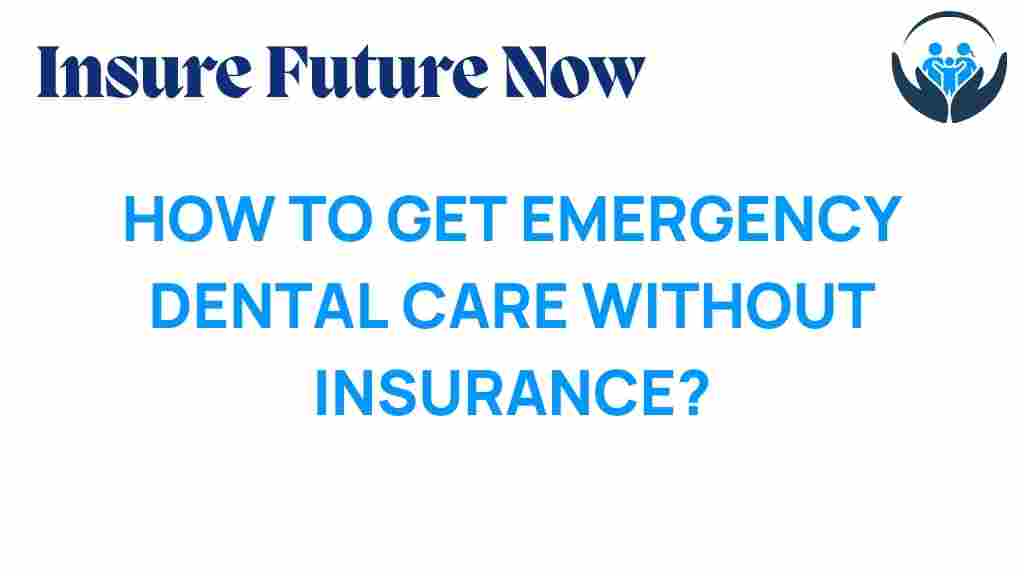Dental emergencies can happen at any time, often when we least expect it. Whether it’s a severe toothache, a broken tooth, or a lost filling, finding the right care can be challenging, especially if you are uninsured. Understanding how to navigate emergency dental care without insurance is crucial for maintaining your oral health and comfort. In this article, we will explore your options for urgent dental treatment, affordable dental options, and useful oral health tips to help you manage dental emergencies effectively.
Understanding Dental Emergencies
Dental emergencies are situations that require immediate attention to relieve pain, prevent further damage, or save a tooth. Some common types of dental emergencies include:
- Severe toothaches
- Knocked-out teeth
- Chipped or broken teeth
- Lost fillings or crowns
- Abscessed teeth
- Soft tissue injuries (gums, cheeks, tongue)
Recognizing what constitutes a dental emergency is the first step in seeking timely help. If you’re experiencing severe pain, swelling, or bleeding, it’s essential to act quickly.
Step-by-Step Process for Seeking Emergency Dental Care
If you find yourself in need of urgent dental treatment but lack insurance, follow these steps to navigate your options effectively:
1. Assess Your Situation
Before making any decisions, evaluate the severity of your dental emergency. Ask yourself the following questions:
- How severe is the pain? Is it manageable or unbearable?
- Is there visible swelling or bleeding?
- Are there any loose or knocked-out teeth?
If your situation is critical, such as excessive bleeding or a knocked-out tooth, seek immediate care.
2. Search for Local Dental Clinics
Look for dental clinics in your area that offer emergency services. Many clinics have provisions for walk-in patients. Use online resources or local directories to find:
- Emergency dental clinics
- Community health centers
- Dental schools that provide reduced-cost services
Check their websites or call them to confirm if they accept patients without insurance.
3. Inquire About Uninsured Dental Services
Many dental clinics offer a range of options for uninsured patients. Be sure to ask:
- Do you have payment plans?
- Are there discounted rates for cash payments?
- What are your prices for common emergency procedures?
Understanding the cost of dental care beforehand can help you make an informed decision.
4. Consider Walk-In Clinics or Urgent Care Centers
If you can’t find a dentist immediately, consider visiting a walk-in clinic or urgent care center. They may not specialize in dental care, but they can provide temporary relief and refer you to a dentist.
5. Explore Financing and Payment Options
Some dental clinics offer financing options that allow you to pay for your treatment over time. Be sure to ask about:
- Payment plans with no interest
- Credit options specifically for dental care
Researching affordable dental options can ease the financial burden of emergency dental care.
Troubleshooting Tips for Common Dental Emergencies
While waiting for professional help, you can take steps to alleviate discomfort:
Toothache
- Rinse your mouth with warm salt water.
- Use over-the-counter pain relievers like ibuprofen or acetaminophen.
- Apply a cold compress to the outside of your cheek.
Knocked-Out Tooth
- Handle the tooth by the crown (top part) and avoid touching the root.
- Rinse it gently with water if dirty, but don’t scrub.
- Try to reinsert it into the socket if possible. If not, place it in a glass of milk or saline solution.
Broken Tooth
- Rinse your mouth with warm water.
- Apply a cold compress to reduce swelling.
- Use dental wax or sugarless gum to cover sharp edges.
Lost Filling or Crown
- For a lost filling, use dental cement or sugarless gum to temporarily fill the cavity.
- For a lost crown, try to reattach it using dental cement or toothpaste temporarily.
These tips can provide temporary relief until you obtain emergency dental care.
Oral Health Tips to Prevent Dental Emergencies
While some dental emergencies are unavoidable, many can be prevented with proper oral care. Here are some essential oral health tips:
- Brush your teeth at least twice a day with fluoride toothpaste.
- Floss daily to remove plaque and food particles between teeth.
- Regularly visit your dentist for check-ups and cleanings.
- Avoid chewing hard foods or ice to prevent broken teeth.
- Wear a mouthguard during sports to protect your teeth from injury.
Maintaining good oral health can significantly reduce the likelihood of experiencing a dental emergency.
Conclusion
Navigating emergency dental care without insurance can be daunting, but it is possible with the right approach. By assessing your situation, seeking local dental clinics, and understanding uninsured dental services, you can find the urgent dental treatment you need. Remember to inquire about affordable dental options and explore financing if necessary. Additionally, implementing oral health tips can help you prevent future dental emergencies.
For more information about dental care options, visit this resource. If you’re looking for local dental clinics, check out this directory for assistance.
Your oral health is vital, and being prepared can make all the difference during a dental emergency. Don’t hesitate to seek help when you need it!
This article is in the category Tips and created by InsureFutureNow Team
